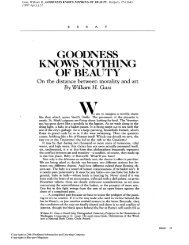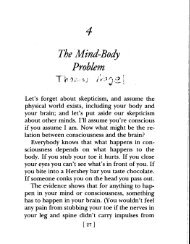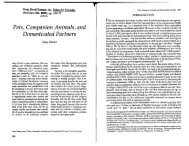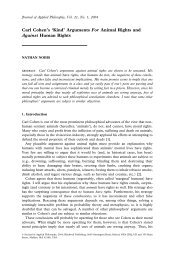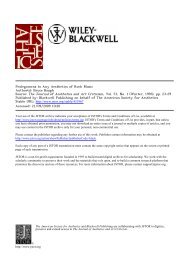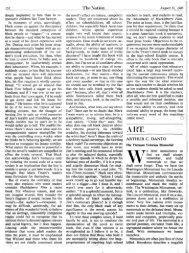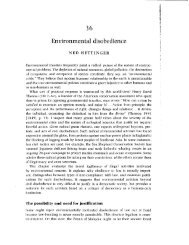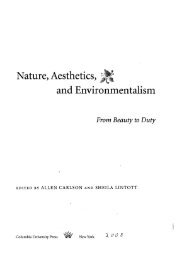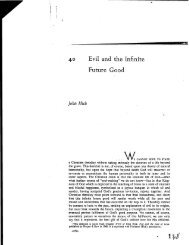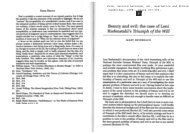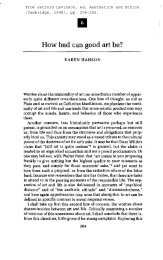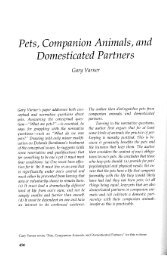Anthropocentrism vs. Nonanthropocentrism: Why Should We Care?
Anthropocentrism vs. Nonanthropocentrism: Why Should We Care?
Anthropocentrism vs. Nonanthropocentrism: Why Should We Care?
Create successful ePaper yourself
Turn your PDF publications into a flip-book with our unique Google optimized e-Paper software.
ANTHROPOCENTRISM VS. NONANTHROPOCENTRISM<br />
181<br />
by other reasons. The ʻshouldsʼ and ʻoughtsʼ that are generated by such reasons should<br />
also be understood as pro tanto.<br />
14<br />
This distinguishes them from other reasons for caring – prudential reasons, for example.<br />
It can, in some circumstances, be in my interest to care about things that arenʼt worth<br />
caring about. For a further discussion of this issue, see DʼArms and Jacobson 2000 and<br />
Rabinowicz and Rønnow-Rasmussen 2004.<br />
15<br />
Anderson 1993; Gibbard 1990; Hursthouse 1999: 108; Oakley 1992, Ch. 6. (While<br />
there is fairly widespread agreement about this claim, there is less agreement about how<br />
we should understand relationship between these two kinds of norms and the role they<br />
play in ethics.) Above, and in what follows, I do not use the term ʻfeelingʼ in the sense it<br />
has taken on in the literature on philosophy of the emotions, where it has come to mean<br />
something like ʻsensationʼ. I use it in the more ordinary, colloquial sense to designate<br />
emotions in general. Of course, the distinction between doing and feeling I am employing<br />
here is a fairly crude one, and there isnʼt room to work out an adequately detailed<br />
account of it here. I trust that there is enough content to our ordinary understanding of<br />
these concepts to make sense of the claims I wish to make involving them.<br />
16<br />
But see Steverson 1995, Stenmark 2002, and Saner 2000 for challenges to Nortonʼs<br />
claim.<br />
17<br />
Thus I disagree with Andrew Lightʼs claim that nonanthropocentrists are committed to<br />
the view that ʻeven a limited endorsement of anthropocentric forms of valuation of nature<br />
would necessarily give credence to those anthropocentric values that prefer development<br />
over preservationʼ (Light 2002: 429).<br />
18<br />
Both feminists and ecofeminists have been urging the importance of questions of<br />
how to feel for quite some time. See, e.g., Karen Warrenʼs discussion of Marilyn Fryeʼs<br />
distinction between ʻarrogant perceptionʼ and ʻloving perceptionʼ in Warren 1990.<br />
19<br />
For a more extended discussion of some of these issues, see Murdoch 2001.<br />
20<br />
See, e.g., Baier 1995: 30–1; Slote 1992: 89.<br />
21<br />
Many of those who think of peopleʼs inner lives (including their feelings) as outside the<br />
scope of moral evaluation, I think, confuse the question of what weʼre entitled to expect<br />
from others – i.e., what claims or obligations we can legitimately place on them – with<br />
the question of what it makes sense to evaluate in ourselves or others. (Thanks to Jeff<br />
Kasser for this way of putting the point.) As Iris Murdoch (citing Hume) points out, ʻgood<br />
political philosophy is not necessarily good moral philosophyʼ (Murdoch 2001: 79).<br />
22<br />
Whether it answers this question at all is a matter of some debate. Some claim that it<br />
answers the question of whether I should try to get myself to admire her, though not the<br />
question of whether I should admire her. For a discussion of this issue, see Rabinowicz<br />
and Rønnow-Rasmussen 2004.<br />
23<br />
Notice that this claim is limited to a particular form of love, namely the love involved<br />
in friendship. The English word ʻloveʼ can be used to refer to a number of very different<br />
valuing attitudes, and I do not want to claim that all of them have the structure I describe<br />
here. My love of sweet potato pie or rock climbing, for example, may well be compatible<br />
with thinking that their value is entirely instrumental. Thanks to Simon Keller for<br />
urging the importance of this point.<br />
24<br />
For a discussion of the structure of attitudes such as this, see Anderson 1993: 8–11,<br />
205–7; for a discussion of the kind of valuing involved in love, see Velleman 1999.<br />
Environmental Values 16.1



